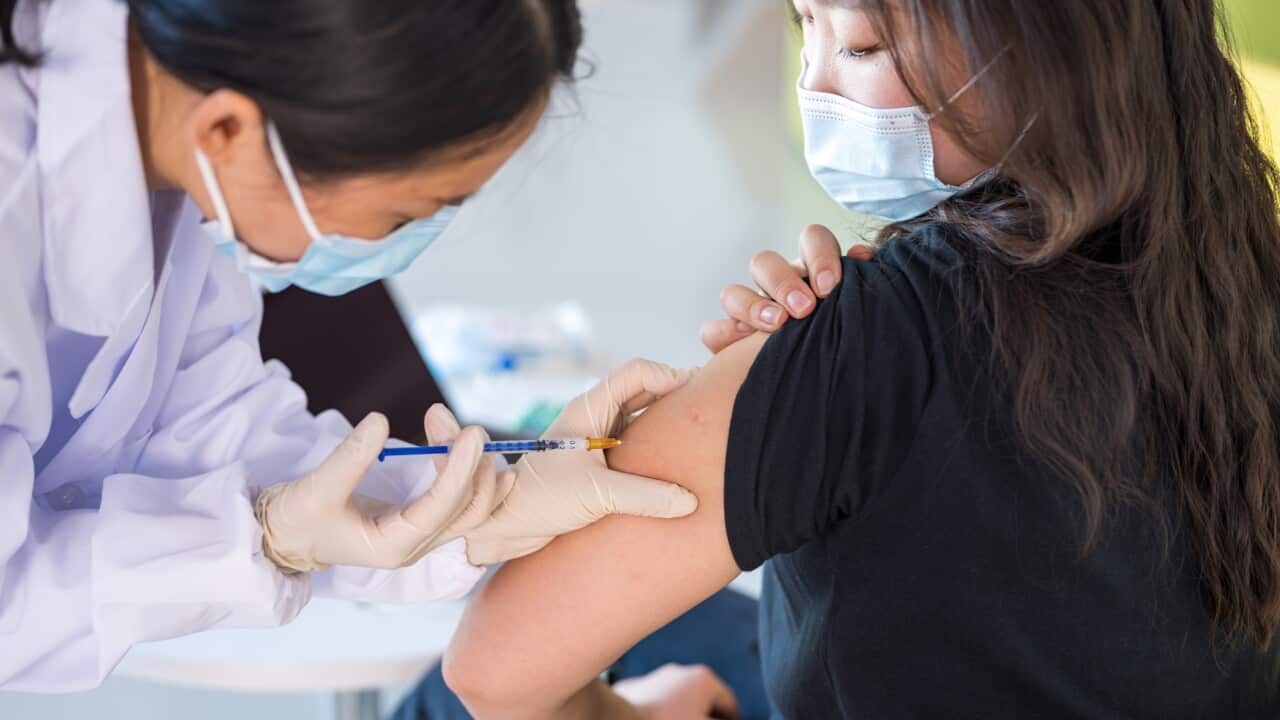Key Points
- The updated Novavax COVID-19 vaccine appears to be delayed for rollout in Australia.
- Australia’s last batch of ancestral Novavax vaccine expired on 31 January, the Therapeutic Goods Administration said.
- The TGA said a formal decision has not been made on the updated vaccine.
A COVID-19 vaccine from American biotech company Novavax appears to have been knocked back for approval by the body that approves medical products in Australia, meaning options for COVID-19 vaccines remain limited.
The delay in the vaccine’s approval means only three vaccine options are available in Australia, all of which are mRNA vaccines.
The Therapeutic Goods Administration (TGA) told SBS News that a formal decision about the new Novavax XBB.1.15 COVID vaccine has not been made yet.
However, in a filing to the US Securities Exchange, Novavax said it had received communication from the TGA that it would not recommend approval of its submissions.
“We are evaluating the regulatory path for approval, including the potential to withdraw the filing for authorisation, update with new data and information, and resubmit in the coming months.”
Novavax said it had cancelled an agreement with the Australian government in March 2024 to distribute doses of the vaccine previously scheduled for delivery in 2023.
The company said it is working with the TGA “on an amendment that addresses performance obligations and future delivery schedules”.
The TGA said it could not comment on if or when the new Novavax COVID-19 vaccine will be available in Australia.
“Ultimately, the supply of any vaccine can only commence once the TGA is satisfied that the product meets strict safety, quality and efficacy standards,” the TGA said.
Australia’s last batch of ancestral Novavax vaccine expired on 31 January, according to the TGA.
What are the dominant coronavirus strains in Australia?
With an expected increase in COVID-19 cases this winter, Australians’ options for COVID jabs are limited to Pfizer’s XBB.1.5 and BA.4/5 vaccine or Moderna’s XBB.1.5 vaccine.
Earlier this month, after the company admitted it could cause rare adverse side effects. The company said at the time that newer vaccines had led to a decline in demand for its COVID-19 vaccine.
The World Health Organization recommended in May that the JN.1 variants should be the target of the next generation of vaccines.
Catherine Bennett, Deakin University’s chair of epidemiology, said while XBB subvariants dominated in Australia last winter, this year will be different.
“The emergence of JN.1 and the related variants (more closely related to BA.2 variants) are now pushing the older XBB and EG5 variants aside,” she said.
“Vaccines provide cross-protection even when targeting different Omicron subvariants, but it’s best to use those most closely related to circulating strains … as we also try to do for seasonal flu,” Bennett said.
Novavax said it is hoping to deliver a JN.1 vaccine globally in September.
How does the Novavax vaccine work?
When Novavax was introduced to Australia it , as it is a more traditional protein-based vaccine.
It differs from mRNA vaccines in that it delivers the spike protein directly into our body, rather than instructing our cells to produce it, Adrian Esterman, chair of epidemiology at the University of South Australia, told SBS News.
“The spike protein itself is made using moth cells in a laboratory, and then an adjuvant is added to it. The adjuvant comes from an extract of the soapbark tree,” Esterman said.
Adjuvants stimulate the immune system, giving a stronger and more long-lasting response against the virus.
Some people do not trust mRNA vaccines, or have had bad reactions to them, Esterman said.
“Novavax being a traditional vaccine would therefore be preferred by these people, and might encourage more to get vaccinated.
“Having said that, when the original bivalent Novavax vaccine was approved in Australia, my understanding is that sales were disappointing.”
According to the TGA, only 268,000 doses of the Novavax vaccine had been administered in Australia to October 2023.
